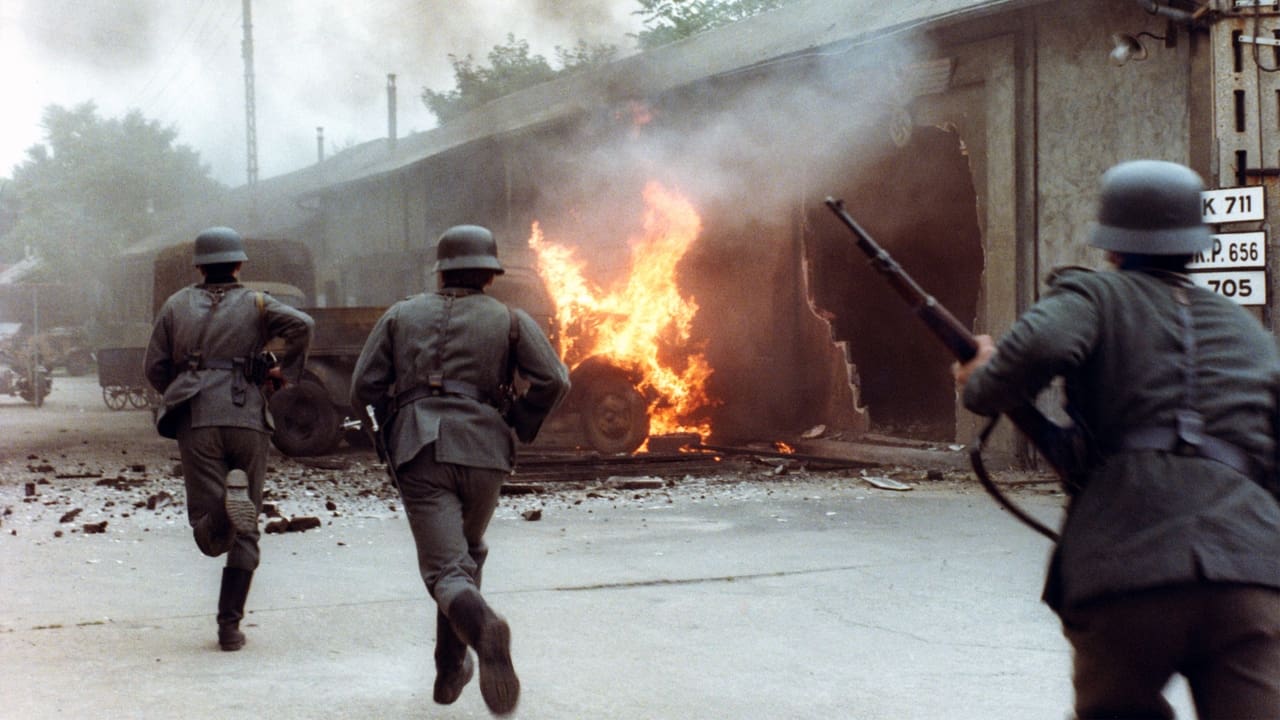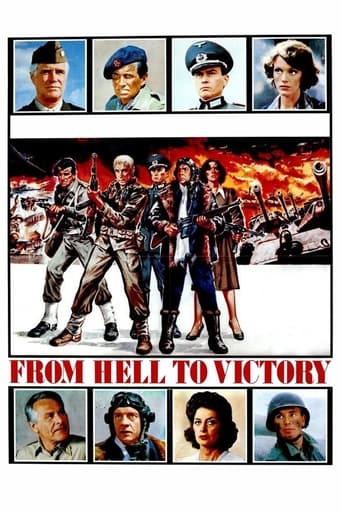Steinesongo
Too many fans seem to be blown away
Smartorhypo
Highly Overrated But Still Good
Tedfoldol
everything you have heard about this movie is true.
TaryBiggBall
It was OK. I don't see why everyone loves it so much. It wasn't very smart or deep or well-directed.
Leofwine_draca
The late '70s saw a change in fortune for cult director Umberto Lenzi. Suddenly, he was the man chosen to make some epic war movies with a decent budget. At last a chance to leave his native Italy and travel through Europe, shooting abroad for many scenes. And at last a chance to work with an internationally famous cast of all-stars. Sadly, Lenzi's worldwide fame was never to be, and instead he found himself back in Italy a few years later churning out schlock cannibal classics such as CANNIBAL FEROX for which he has become somewhat infamous in cult film circles. Although his late '70s war films are flawed and sometimes feel bloated and overlong, they're certainly a lot better than the subsequent mid '80s war features he made and technically superior to those he did in the late '60s. FROM HELL TO VICTORY is also probably the only Umberto Lenzi film to have been granted a terrestrial television broadcast here in the UK, albeit in the middle of the night on Channel 5! The film itself is a straightforward war adventure, chronicling and cutting between the adventures of a small group of friends who find themselves facing death during the Second World War. The action is generally good but not great, although the final battle is quite spectacular, with the budget only being evident in the aerial combat scenes which substitute silly miniature planes in place of real ones, mixed together with stock footage in a bid to fool the casual viewer. Sad to say the scheme didn't work, although the result is somewhat amusing. Generally the pacing is solid enough and - whilst hardly a classic action film like the cop thrillers Lenzi made with actor Maurizio Merli - the film delivers the goods with some style and excitement.The casting mixes together a number of old and new faces, with some Euro-regulars thrown into the mix for good measure. Veteran support comes from George Peppard as the grizzled war general, whilst the role of his fresh-faced son goes to the ever-present Ray Lovelock. George Hamilton is somewhat camp as a caricatured, beret-wearing Frenchman, although heavyweight acting comes from Sam Wanamaker as an ally. Meanwhile, Anny Duperey and Capucine liven up the glamour front, Franco regular Howard Vernon fits the role of an evil Nazi like a glove, and Horst Buchholz struggles with his conscience and his duty as a German fighter. Not a classic film, but a pretty entertaining one for war lovers.
paul_johnr
'Contro 4 Bandiere' AKA 'From Hell to Victory' was a last hurrah in epic war film-making for director Umberto Lenzi. Lenzi first broke into this genre during the late 1960s when he made two Second World War potboilers, 'Desert Commandos' (1967) and 'Battle of the Commandos' (1969). While cheaply made, the films were energetic and drew attention to a young talent. Nearly a decade passed, however, before Lenzi touched upon war films again, preferring to work in giallo, poliziottescho, and horror. 'The Greatest Battle,' Lenzi's third war film, was a highly-budgeted flop in 1978 that included Henry Fonda, John Huston, and Orson Welles. Just one year later, Lenzi was given another chance with 'From Hell to Victory,' a bungled French-Italian co-production that again offered noteworthy actors and sizable production values.Outside of a few gialli and poliziotteschi, there are not many good things to say about Lenzi's résumé and his critics will find plenty of ammunition in 'From Hell to Victory.' The film offers a unique concept, but its plot line and script are mostly a rewrite of 'The Greatest Battle,' shown in theaters just one year before. Producer Edmondo Amati's inability to finance battle scenes is also clear throughout, with Lenzi using stock footage to piece together the action. While such cleverness may have worked in cinemas thirty years ago, Lenzi's penny-pinching is easily dissected through VHS tapes and DVD, making him an easy target for ridicule.'From Hell to Victory' opens in August, 1939, at a Parisian riverside café, where six intellectuals are enjoying a day out. With war on the horizon, these friends agree to reunite at the café every August 24th, regardless of circumstance. The Second World War breaks up their plans, however, as all six people disband across Europe. American Brett Rosson (George Peppard) becomes an OSS officer and meets up with estranged son Jim (Ray Lovelock), who is disgusted by his relationship with a French heiress (Capucine). Frenchman Maurice Bernard (George Hamilton) survives the Dunkirk evacuation and becomes a commando for the allied forces. Englishman Richard Sanders (Jean-Pierre Cassel), also a Dunkirk veteran, protects his country as an RAF fighter. German Jürgen Dietrich (Horst Buchholz) becomes a high-ranking Nazi officer. Second American Ray MacDonald (Sam Wanamaker) becomes a war correspondent in London, finally meeting his grown English daughter Mary (May Heatherly). The lone woman of the six is Fabienne Bonnoir (Anny Duperey), who joins the French Resistance.Like 'The Greatest Battle,' this film uses its characters as a springboard for wartime events. However, the script of 'From Hell to Victory' is considerably better; rather than using the characters as superficial glue, they are a key element of what is taking place. These six people are important to the larger wartime scenarios and they undergo a small amount of development. The storyline is more fleshed out than in 'The Greatest Battle' and there are actually some touching moments. To the film's credit, 'From Hell to Victory' is well-acted; Peppard, Hamilton, and the other cast members have sympathy for their roles and do their best to overcome the script's weaknesses.However, 'From Hell to Victory' is a technical fiasco. It is poorly shot, has incredibly bad editing, and does a rotten job of 'pretending' to be on a much greater scale than was actually filmed. When away from the battlefields, 'From Hell to Victory' has a fair amount of competence; but Lenzi (credited as 'Hank Milestone') did not have billions of francs or lira at his disposal and was forced to use aerial and infantry stock footage from larger productions. Care was taken in the new sequences to make them fit with the old, but it's all too obvious that clips were taken from another source. Lenzi and hack editor Vincenzo Tomassi attempted to hide this by using breakneck pacing and angle-changing that has been a constant in the director's films. This fast pace captures the insane atmosphere of war, but it also looks poorly organized and amateurish. Cinematographer José Luis Alcaine has won numerous awards for his work and you would never know it from the murky, uncoordinated picture that's on display here. On the other hand, there is fairly good dubbing and the uplifting orchestral score of Riz Ortolani actually rates with Hollywood compositions.With the Italian film industry waning in 1979, 'From Hell to Victory' was Lenzi's final chance to direct an epic and he finished light years short in most respects. 'From Hell to Victory' was doomed to budget limitations and had its fate sealed from the outset. This is unfortunate, because a wonderful idea is hiding underneath the poor script, slapdash direction, and horrendous technical work. One can only guess what might have resulted from a company with more time and finances at its disposal. Certainly, the film's plot would have been more thorough (it's just 101 minutes long!) and perhaps a few genuine planes and tanks would have been thrown into the bargain.'From Hell to Victory' was actually broadcast on CBS Television in the mid-80s and has survived on VHS tape amongst collectors. In 2004, Trinity Home Entertainment released a no-frills DVD that doesn't really improve on older versions. The film is presented in widescreen, but seems to have an incorrect aspect ratio at times; I can't tell if this resulted from a poor transfer or bad filming on Lenzi's part. Trinity never seems to clean up the titles in their catalogue and, unsurprisingly, this film is loaded with grain and artifacts. The sound is in Dolby 2.0, which brings Riz Ortolani's score to the forefront; however, dialogue carries an underlying hiss and crackle. You can forget about extras on this disc and it would be nice if Lenzi were interviewed about his war films at some point, especially since they drew the best actors of his career. If nothing else, 'From Hell to Victory' is a curious item and deserves one look for its major cast.** out of 4
bkoganbing
Not that George Peppard and George Hamilton were any kind of buddy duo in the way Burt Lancaster and Kirk Douglas were, but they did do two well received films together, The Victors and Home from the Hill. But for a reunion film it would have been nice if they had gotten something better than this.In fact this is a reunion film of a bunch of players who seem to hit the heights of their careers around the beginning of the Kennedy years. Peppard, Hamilton, Capucine. Horst Bucholtz all were at their respective peaks around 1961. None of them ever really reached any kind of screen immortality and with only Hamilton left among them were not likely to see another reunion film.Thankfully not another one like Contro 4 Bandiere. It's a cobbled together film of action sequences from other products and newsreels. The plot has six friends of varying background in Paris having good times a week before the start of World War II. They pledge to see each other at that Paris cafe every year, but war does intervene and they're all not on the same side.Some make it, some don't and if you're interested to see who shows up then watch Contro 4 Bandiere.
Joker-26
Apart from the German and Allied uniforms in this film, there's not much else to it. I mean, come on, they painted German markings on British spitfires and funnily enough the Brits looked like they were flying Curtis fighters (US-made). And the whole sequencing of the air battles looked so fake, as if from a 1930s film. And some of the air shots looked like they were done in a studio with arm-sized aircraft models!! Did anyone remember the tank battle as well at the end. The 'German' Panzers were actually American Patton tanks, built around the late 40s. It just looked so amateurish and cheap when you compare it to a film like a Bridge too Far, made ten years earlier (and which I concede had a much bigger budget). I mean, why bother with air and tank battles when you can't even make them look half realistic? The other thing i noticed was that all the explosions that were supposed to be stopping the 'Panzers' actually exploded beside or in front of the tanks, and yet the tank would come to a grinding halt!! Ridiculous.But I'll admit the military action not involving tanks and aircraft looked decent enough (such as when Peppard infiltrates enemy installations to plant explosives, etc.) But overall the acting was wooden, mainly from the main actors. The only good performance was from George Hamilton who played 'Maurice', a French commando. Peppard himself was ok, but he did have a better acting scope than this which was not utilised.Overall, 3/10.

